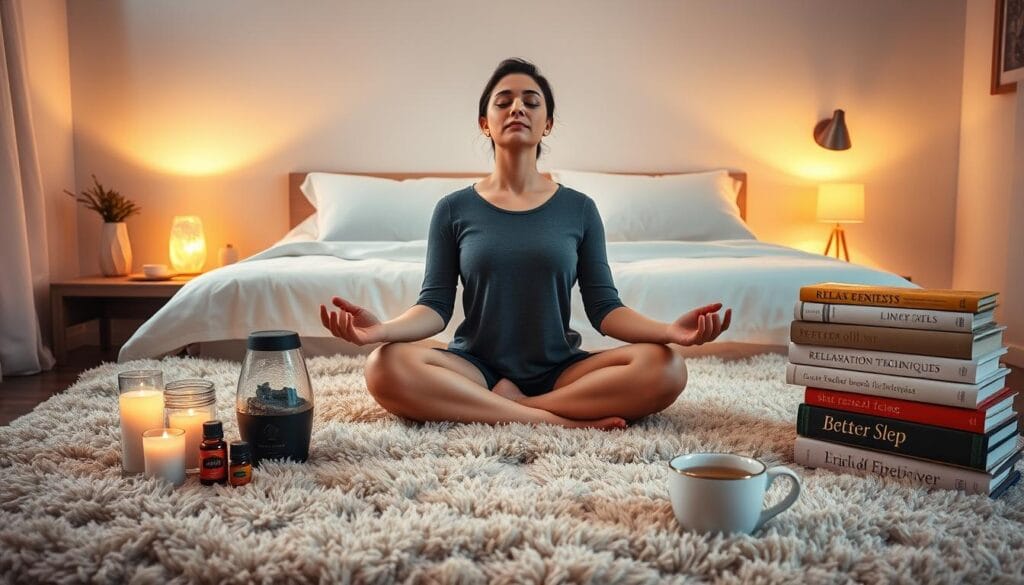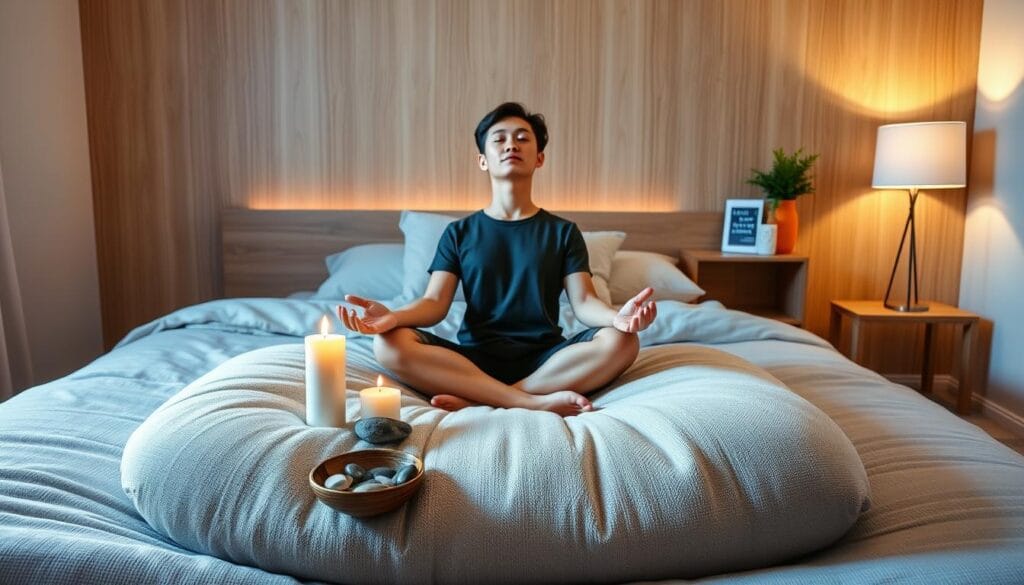Sleeping Better with Anxiety by Natural Solutions

Sleeping Better with Anxiety: Anxiety can really mess with your sleep, leading to sleep disorders. Finding ways to ease anxiety is key to better sleep. Many people face insomnia because of anxiety, which makes anxiety worse, creating a tough cycle.
It’s important to understand how anxiety affects sleep. Knowing this can help you start working on peaceful rest. You can also look into natural ways to ease anxiety.
Dealing with anxiety is crucial for Sleeping Better. There are many ways to relax and manage stress. These can help you sleep better and reduce sleep disorders.
Natural Way To Support Calmness
Introduction to Anxiety and Sleep
Sleep is vital for our health, and anxiety can mess with it. It’s important to find ways to ease anxiety for Sleeping Better. By trying natural remedies and managing anxiety, you can Sleeping Better and avoid sleep disorders.
Key Takeaways
- Anxiety can significantly impact sleep quality, leading to sleep disorders
- Effective anxiety relief is crucial for improving sleep patterns
- Understanding the connection between anxiety and sleep is essential for developing strategies to address sleep disorders
- Relaxation techniques and stress management strategies can help alleviate anxiety
- Natural remedies can help improve sleep quality and reduce sleep disorders
- Addressing anxiety is vital for achieving peaceful rest
Natural Way To Support Calmness
Understanding the Anxiety-Sleep Connection
Anxiety and Sleeping Better are closely linked. Anxiety can make it hard to relax and fall asleep. This can start a cycle of insomnia, where anxiety about sleep makes it worse.
Practicing relaxation techniques, like deep breathing or progressive muscle relaxation, can help. These methods manage stress and promote better sleep.
Managing stress is key to breaking this cycle. By using relaxation techniques, people can improve their sleep and reduce insomnia risk. Signs of anxiety affecting sleep include trouble falling asleep, waking up often, and feeling tired during the day.
- Establishing a consistent sleep schedule
- Creating a relaxing bedtime routine
- Practicing stress management techniques, such as meditation or yoga
By adding these strategies to daily life, people can lower their anxiety and Sleeping Better. This leads to better health and well-being overall.
Natural Way To Support Calmness
Creating a Sleep-Friendly Environment
Creating a sleep-friendly space is key for Sleeping Better, especially with anxiety and insomnia treatment. It should be dark and quiet to help you relax. A comfy mattress and pillows also help a lot.
Doing mindfulness exercises like meditation and deep breathing can help you relax before sleep. These can be part of your bedtime routine. A regular sleep schedule and a cool, well-ventilated room also help.
Here are some important things for a sleep-friendly space:
- Turn off screens and electronic devices before bed
- Stay away from exciting activities and talks before sleep
- Use calming colors and textures to create a soothing atmosphere
By adding these elements and doing mindfulness exercises, you can make a space that helps you relax and sleep better. This can help with insomnia treatment and lower anxiety.
Essential Natural Sleep Remedies for Anxiety
Good sleep hygiene is key to managing anxiety-induced insomnia. Adding calming strategies to your daily life can help. Natural sleep remedies, like herbal supplements and teas, are effective.
Herbal supplements like melatonin and valerian root can help regulate sleep. Aromatherapy solutions like lavender and chamomile essential oils also calm the mind and body.
Tools like white noise machines and sleep masks are also helpful. They create a sleep-friendly environment and block distractions. Combining these remedies with good sleep habits can improve sleep quality and reduce anxiety.
- Herbal supplements: melatonin, valerian root
- Aromatherapy solutions: lavender, chamomile essential oils
- Natural sleep aids: white noise machines, sleep masks
Always talk to a healthcare professional before trying new supplements or remedies. This is especially true if you’re on medication or have a health condition. With a healthcare professional’s guidance, you can create a plan to manage insomnia and improve sleep hygiene.
Natural Way To Support Calmness
Mindfulness and Meditation Techniques
Practicing mindfulness and meditation can help manage anxiety and improve sleep. These methods calm the mind and body. This makes it easier to fall asleep and stay asleep. Adding yoga and tai chi to your daily routine can reduce anxiety and promote relaxation.
Mindfulness and meditation offer great anxiety relief. They help you focus on the present moment. This lets you forget worries about the past or future. It’s especially helpful for those with anxiety and insomnia, as it calms the mind and body before bed.
Some popular mindfulness and meditation techniques include:
- Transcendental meditation
- Guided imagery
- Yoga
- Tai chi
These techniques can be done at home or in a class. They can be adjusted to fit your needs and schedule. By making mindfulness and meditation part of your daily routine, you can improve your sleep and overall well-being.
Remember, taking care of your mental and physical health is key to managing anxiety and improving sleep. By using natural remedies like mindfulness and meditation, you can relax and reduce anxiety. This leads to better sleep and a healthier, happier life.
Natural Way To Support Calmness
Breathing Exercises for Better Sleep
Practicing relaxation techniques, like breathing exercises, can calm the mind and body. This makes it easier to fall asleep. Regular breathing exercises are key for stress management, helping you relax before bed.
By adding these exercises to your bedtime routine, you can sleep better. You’ll wake up feeling refreshed and ready to go.
Some effective breathing techniques for better sleep include:
- Deep breathing methods, which involve slow, deliberate breaths to calm the nervous system
- The box breathing technique, which involves breathing in for a count of four, holding for a count of four, exhaling for a count of four, and holding again for a count of four
- The 4-7-8 breathing pattern, which involves breathing in through the nose for a count of four, holding for a count of seven, and exhaling through the mouth for a count of eight
These techniques can be practiced regularly to help manage stress and anxiety. This leads to better sleep quality. By making relaxation techniques a priority, you can start sleeping better.
Natural Way To Support Calmness
Dietary Changes That Promote Better Sleep
Diet can greatly affect sleep quality. A good diet helps regulate sleep, while a bad one can disrupt it. Mindfulness exercises can help you eat better, leading to better sleep. For those with insomnia, changing what you eat is a key step to feeling better.
Some foods, like tart cherries and walnuts, can help you sleep better. They have melatonin and other compounds that promote sleep. It’s also important to avoid caffeine, nicotine, and big meals before bed. Paying attention to when you’re hungry or full can help you eat more healthily and avoid insomnia.
Here are some tips for better sleep through diet:
- Eat a balanced diet rich in fruits, vegetables, and whole grains
- Avoid caffeine and nicotine close to bedtime
- Limit heavy meals and rich foods before bedtime
- Incorporate sleep-promoting foods, such as tart cherries and walnuts, into your diet
Natural Way To Support Calmness

By changing your diet and adding mindfulness to your day, you can sleep better. A healthy diet and mindful eating are key to feeling well and sleeping well.
Natural Way To Support Calmness
Exercise and Physical Activity Guidelines
Regular exercise is key for good sleep hygiene and less anxiety. But, when you work out can affect your sleep. Knowing how exercise impacts your body and mind is crucial.
Doing calming strategies like yoga or walking can lower anxiety and relax you. These are great in the evening to tell your body it’s time to sleep. A regular exercise plan can also help your sleep patterns and hygiene.
- Start with short, manageable sessions and gradually increase duration and intensity
- Choose low-impact activities that promote relaxation, such as yoga or swimming
- Avoid vigorous exercise within a few hours of bedtime, as it can interfere with sleep
Adding physical activity to your day and good sleep habits can better your sleep and lower anxiety. Listen to your body and find what works for you.
Establishing a Calming Bedtime Routine
As the day ends, it’s key to tell your body it’s time to sleep. A soothing bedtime routine can do this, offering natural remedies for calm and anxiety relief. Activities like reading, meditation, or a warm bath can calm your mind and body.
Some find natural remedies like melatonin or valerian root helpful. They can be taken as supplements or in teas, bringing calm and relaxation. Also, a regular sleep schedule and a sleep-friendly space help a lot for a good night’s sleep.
- Set a consistent sleep schedule
- Create a sleep-friendly environment
- Incorporate natural remedies like melatonin or valerian root
- Engage in relaxing activities like reading or meditation
Adding these to your bedtime routine can help with anxiety relief and better sleep. This means waking up feeling refreshed and ready to go.
Natural Way To Support Calmness
Technology and Sleep: Finding the Right Balance
Technology is everywhere in our lives. It’s key to find a balance between using it and getting good sleep. Technology can mess with our sleep, but it can also help us relax and manage stress. By using digital wellness apps and managing screen time, we can improve our sleep and tech relationship.
Some apps offer guided meditation and relaxation to calm our minds and bodies before bed. These apps are great for those who find it hard to relax and manage stress. Also, avoiding screens for at least an hour before bed can really help improve sleep.

- Set a consistent sleep schedule and stick to it
- Create a bedtime routine that signals the body that it’s time to sleep
- Use blue light filtering glasses or apps to reduce screen glare
By using these strategies and being careful with our tech use, we can get better sleep. Good stress management and relaxation are key for a good night’s rest. With the right approach, we can find a healthy balance between tech and sleep.
Natural Way To Support Calmness
Alternative Therapies and Professional Support
For those dealing with anxiety and insomnia, mindfulness exercises can be very helpful. They help lower stress and make it easier to relax and sleep. Other therapies like acupuncture and cognitive-behavioral therapy (CBT) can also help tackle the root causes of insomnia.
When looking at insomnia treatment, a full approach is key. This includes working with a therapist to tackle anxiety and stress. Getting professional help can help you understand your condition better and find ways to manage symptoms.
Benefits of alternative therapies and professional support include: * Less anxiety and insomnia symptoms * Better sleep quality * Feeling more relaxed and calm * Stronger ways to handle stress
Exploring alternative therapies and getting professional help can be a big step. With the right tools and support, you can create a plan to manage your symptoms. This can greatly improve your overall well-being.
Natural Way To Support Calmness
When to Consider Additional Help
Practicing good sleep hygiene and using calming strategies can help with anxiety and sleep. But, some people might need more help. If your sleep problems keep coming back or get worse, it’s time to look for professional help.
Signs you might need more help include persistent insomnia or severe anxiety that affects your daily life. In these cases, finding the right sleep specialist is crucial. They can help you get better sleep and improve your overall well-being.
To find the right sleep specialist, consider the following:
- Ask for referrals from your primary care physician or other healthcare professionals
- Check for certifications and credentials, such as board certification in sleep medicine
- Read reviews and testimonials from previous patients to get an idea of the specialist’s approach and bedside manner
By following these steps, you can find a qualified sleep specialist. They can help you create a plan to improve your sleep hygiene and calming strategies. This will lead to better sleep and a healthier life.
Natural Way To Support Calmness
Conclusion: Building Your Personal Sleep Strategy
Improving your sleep starts with tackling anxiety. By using natural remedies and strategies, you can control your sleep. This means trying out natural sleep aids, relaxation techniques, or making lifestyle changes.
Creating a sleep plan is a journey of self-discovery. Be kind to yourself as you try different anxiety relief methods. With time and effort, you can overcome anxiety and insomnia. This will help you get the restful sleep you need.
Natural Way To Support Calmness
FAQ
How can anxiety affect my sleep patterns?
Anxiety can mess with your sleep in many ways. It might make it hard to fall asleep or wake you up a lot at night. This can leave you feeling tired and exhausted during the day. It’s important to tackle the anxiety to get better sleep.
What are some natural remedies that can help me sleep better with anxiety?
Natural remedies like melatonin and valerian root can help with sleep. Aromatherapy with lavender and chamomile can also be soothing. Try meditation and deep breathing to relax.
How can I create a sleep-friendly environment to promote better rest?
To sleep better, start a bedtime routine and make your bedroom dark, quiet, and comfy. Yoga or meditation can also help create a peaceful space.
What role does diet and exercise play in improving sleep with anxiety?
Eating right and staying active can help your sleep. Avoid caffeine and heavy meals before bed. Choose exercises that calm your mind, like yoga or walking.
When should I consider seeking professional help for my sleep and anxiety issues?
If you can’t sleep well or feel really anxious, it’s time to get help. A sleep specialist can create a plan just for you. They’ll help you find ways to manage your anxiety and improve your sleep.
